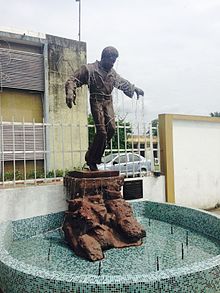Ernesto Djédjé
Ernesto Djédjé (* 1947 in Daloa ; † June 9, 1983 in Yamoussoukro ; also Ernesto Dje-Dje ) was an Ivorian musician (vocals, guitar). He is considered the father and founder of Ziglibithy . He was adorned with nicknames such as “Gnoantré national” (means “national fight” in his mother tongue), “Épervier” (Sparrowhawk) or “Roi du ziglibithy” (King of Ziglibithy).
life and work
Djédjé, who comes from the Bété people in Côte d'Ivoire , began playing guitar at the age of 15 in the group Ivoiro Star , a band that was very popular at the time. In 1968 he moved to Paris as a computer science student, where he continued to play music and made another recording in 1970 with the help of Manu Dibango . In 1972 he returned to his homeland, where he founded his band “Les Ziglibithiens” and continued to cultivate and spread the “Ziglibithy” style he had created.
Djédjé recorded his first solo album in 1977; it bears the title "Ziboté". Another album, "Le Roi du Ziglibithy", was released in 1977 on Badmos Records; it is considered his best album. The original editions of the albums on vinyl are sought-after collector's items. Djédjé's Ziglibithy is strongly syncopated dance music, with rambling guitar lines and accented with rich brass. His style of hits like Ziboté and Aguisse inspired other Ivorian musicians.
Djédjé was one of the first musicians whose music also had an impact in neighboring countries such as Burkina Faso , Togo and Zaire . In 1982 he was honored by the Ivorian President Félix Houphouët-Boigny for his contributions and services to national culture. Ernesto Djédjé suddenly died in Yamoussoukro in 1983 at the age of 35. The cause of death is not clear.
literature
- Ronnie Graham: World of African Music: Stern's Guide to Contemporary African Music Pluto, London 1992; ISBN 0745305520
| personal data | |
|---|---|
| SURNAME | Djédjé, Ernesto |
| ALTERNATIVE NAMES | Dje_Dje, Ernesto |
| BRIEF DESCRIPTION | Ivorian musician |
| DATE OF BIRTH | 1947 |
| PLACE OF BIRTH | Daloa , Ivory Coast |
| DATE OF DEATH | June 9, 1983 |
| Place of death | Yamoussoukro , Ivory Coast |
